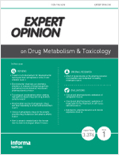
Expert Opinion on Drug Metabolism & Toxicology
Scope & Guideline
Innovative Perspectives on Drug Metabolism and Toxicology
Introduction
Aims and Scopes
- Clinical Pharmacokinetics and Pharmacodynamics:
The journal emphasizes the study of pharmacokinetics and pharmacodynamics, exploring how drugs are absorbed, distributed, metabolized, and excreted in various populations, including pediatric and geriatric patients. - Drug Interactions and Toxicology:
A core focus is on drug-drug interactions and their implications for safety and efficacy, particularly in populations with complex medical needs or those undergoing polypharmacy. - Pharmacogenomics and Personalized Medicine:
The journal highlights research on genetic factors influencing drug metabolism and response, promoting the integration of pharmacogenomic data into clinical practice for optimizing drug therapy. - Innovative Drug Development and Safety Assessments:
It includes studies on novel therapeutic agents, their safety profiles, and the role of various models (e.g., organ-on-a-chip) in predicting drug behavior and toxicity. - Emerging Therapies and Treatment Strategies:
The journal discusses advancements in treatment strategies for various conditions, including cancer, infectious diseases, and chronic conditions, focusing on the pharmacological aspects. - Methodological Advances in Toxicology and Drug Testing:
It covers methodological advancements in drug testing, including in vitro and in silico approaches, aiming to improve the prediction of drug toxicity and efficacy.
Trending and Emerging
- Machine Learning and Artificial Intelligence in Pharmacology:
Recent publications show an increasing interest in applying machine learning and AI techniques to predict drug interactions and toxicity, enhancing the drug development process. - Gut Microbiome and Drug Interactions:
Research on the impact of the gut microbiome on drug metabolism and efficacy is emerging, reflecting a growing recognition of its role in personalized medicine. - Physiologically Based Pharmacokinetic (PBPK) Modeling:
There is a notable trend towards utilizing PBPK modeling to better simulate drug behavior in humans, particularly in special populations such as children and the elderly. - Focus on Antiretroviral and Oncological Therapies:
An increasing number of studies are dedicated to the pharmacokinetics and toxicology of antiretroviral drugs and novel cancer therapies, highlighting their clinical significance. - Environmental and Regulatory Perspectives in Drug Safety:
Emerging themes include the assessment of drug safety in the context of environmental exposure and regulatory frameworks, as researchers seek to align drug development with public health goals.
Declining or Waning
- Traditional Toxicology Assessments:
There is a noticeable decrease in papers focusing on traditional toxicological assessments, such as acute toxicity testing, as newer in vitro and computational models are gaining traction. - Generalized Drug Safety Studies:
Research that does not focus on specific populations or drug interactions is less frequently published, indicating a shift towards more targeted studies that consider individual variability. - Non-Clinical Animal Studies:
The reliance on animal models for drug metabolism and toxicity studies seems to be waning as researchers explore more humane and innovative alternatives, such as human-derived cell models.
Similar Journals
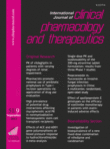
INTERNATIONAL JOURNAL OF CLINICAL PHARMACOLOGY AND THERAPEUTICS
Unveiling the science behind effective therapeutics.INTERNATIONAL JOURNAL OF CLINICAL PHARMACOLOGY AND THERAPEUTICS, published by DUSTRI-VERLAG DR KARL FEISTLE in Germany, is a vital scholarly platform dedicated to advancing the field of pharmacology through rigorous research and innovative therapeutic strategies. Established in 1994, this journal has maintained its relevance in the evolving landscape of clinical pharmacology, achieving a Q3 rank in both general and medical pharmacology categories as of 2023. With an ISSN of 0946-1965, it is positioned as an essential resource for researchers, healthcare professionals, and students seeking to enhance their understanding of drug therapy and pharmacological applications. Though it currently does not offer open access, its comprehensive scope covers a wide array of topics within pharmacology, promising to contribute significantly to scientific discussions and knowledge dissemination from 1994 to 2024. Whether you are looking for the latest studies or historical insights, the journal remains a fixture for anyone invested in the pharmacological sciences.
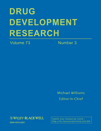
DRUG DEVELOPMENT RESEARCH
Advancing pharmaceutical innovation through rigorous research.DRUG DEVELOPMENT RESEARCH is a premier interdisciplinary journal published by Wiley, focusing on the latest advancements in drug discovery, pharmacology, and toxicology. With an ISSN of 0272-4391 and an E-ISSN of 1098-2299, this esteemed publication has been a cornerstone in the field since its inception in 1981 and continues to provide cutting-edge research until 2024. Its rigorous peer-review process and strategic placement in Q2 of the Drug Discovery category, as well as ranking #60 out of 157 in Scopus, underscore the journal's relevance and influence, boasting a respectable 62nd percentile ranking. While the journal does not currently offer open access, it remains a vital resource for researchers, professionals, and students seeking to expand their knowledge on the processes of drug development, identifying new therapeutic targets, and assessing the efficacy and safety of novel compounds. Situated in Hoboken, NJ, this journal stands at the forefront of pharmaceutical innovation, making significant contributions to the advancement of medical science.
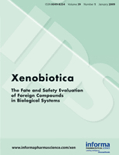
XENOBIOTICA
Elevating Understanding of Xenobiotic Challenges.XENOBIOTICA is a premier journal in the field of pharmacology and toxicology, published by Taylor & Francis Ltd. With an ISSN of 0049-8254 and E-ISSN 1366-5928, this journal has been at the forefront of research since 1971, providing critical insights and advancements up until 2024. It is recognized for its rigorous peer-reviewed content, occupying a third quartile ranking across various categories including Biochemistry, Health, Toxicology, and Pharmacology as of 2023. The journal serves as a pivotal platform for disseminating innovative findings that address the impact of xenobiotics on health and the environment, making it an essential resource for researchers, professionals, and students engaged in these multidisciplinary fields. While it does not currently offer open access, it is widely respected for its contribution to science, evidenced by its Scopus rankings across different areas of study. The journal encourages submissions that push the boundaries of knowledge and transform our understanding of the effects of chemical substances on living organisms.
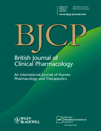
BRITISH JOURNAL OF CLINICAL PHARMACOLOGY
Fostering Excellence in Pharmacological ResearchBritish Journal of Clinical Pharmacology, published by Wiley, is a premier peer-reviewed journal that has been at the forefront of pharmacology research since its inception in 1974. Renowned for its high academic rigor, it stands out with an impressive impact factor that places it in the Q1 quartile within both the general pharmacology and medical pharmacology categories. With a Scopus ranking reflecting its esteemed status—ranked #68 out of 272 in medical pharmacology and #109 out of 313 in pharmacology, toxicology, and pharmaceutics—the journal serves as a critical resource for researchers, clinicians, and students who are keen to explore innovations and advancements in drug therapy. The journal's scope encompasses a wide array of topics, including clinical trials, drug safety, and pharmacokinetics, making it an essential platform for disseminating cutting-edge pharmacological findings. Although it does not offer open access, the stringent selection of articles ensures that only the highest-quality research is published, further contributing to the ongoing discourse in clinical pharmacology.

Pharmaceutical Sciences
Exploring innovative solutions in pharmaceutical sciences.Pharmaceutical Sciences, an esteemed journal published by Tabriz University of Medical Sciences, Faculty of Pharmacy, serves as a crucial platform for the dissemination of pioneering research in the fields of pharmaceutical science, pharmacology, and toxicology. With an impact factor reflective of its substantial contribution to the scientific community, this open access journal has been accessible since 2012, ensuring that researchers, professionals, and students worldwide can engage with its rich content. Located in Iran, it has continually evolved, covering research from 2009 to 2024, and boasts impressive rankings in multiple Scopus categories, including Q3 in Pharmaceutical Science and Q2 in Pharmacology, Toxicology and Pharmaceutics. By bridging gaps between scientific inquiry and practical applications, Pharmaceutical Sciences is dedicated to advancing pharmaceutical knowledge and promoting innovative practices that address significant health challenges.

DRUGS IN R&D
Empowering innovation in drug development and research.DRUGS IN R&D is a premier open access journal dedicated to advancing the field of pharmacology and drug development. Published by Springer International Publishing AG, this journal has been a valuable resource for researchers and professionals since its inception in 1999, contributing critical insights into the pharmacological sciences. With an impressive Impact Factor reflecting its significance, DRUGS IN R&D ranks in the Q2 quartile for Pharmacology, according to 2023 metrics, and ranks #151 out of 313 in the field of pharmacology and toxicology on Scopus. This journal offers an open access format, ensuring high visibility and accessibility of research findings to a global audience, supporting the intrepid pursuit of knowledge in drug research and development. By facilitating comprehensive discussions and innovative research findings, DRUGS IN R&D plays a crucial role in shaping the future landscape of pharmacological studies and advancements.

International Journal of Pharmacology
Innovating Insights in Drug Development and SafetyWelcome to the International Journal of Pharmacology, a key publication in the field of pharmacology, published by ASIAN NETWORK SCIENTIFIC INFORMATION (ANSINET). Since its inception in 2006, this journal has provided a vital platform for researchers and professionals to disseminate their findings and insights in pharmacology, toxicology, and pharmaceutics. Despite recent discontinuation in Scopus coverage, the journal's dedication to fostering scientific dialogue continues to attract contributions from esteemed scholars globally. With an **ISSN of 1811-7775** and **E-ISSN of 1812-5700**, the journal seeks to bridge the gap between laboratory research and clinical application, promoting a deeper understanding of drug actions and interactions. Although it operates under traditional access options, the relevance of its published studies to ongoing pharmacological research remains significant.
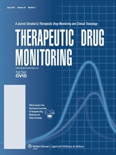
THERAPEUTIC DRUG MONITORING
Advancing Pharmacology for Safer, More Effective TherapiesTHERAPEUTIC DRUG MONITORING, published by Lippincott Williams & Wilkins, is a prestigious journal that focuses on the critical area of pharmacology, with a specific emphasis on the therapeutic optimization of drug therapy. With an ISSN of 0163-4356 and an E-ISSN of 1536-3694, this peer-reviewed journal has been contributing valuable research and insights to the field since its inception in 1979. As of 2023, it holds a Q2 classification in the Pharmacology category, indicating its prominent role in advancing pharmaceutical sciences. The journal aims to enhance understanding of drug effectiveness and safety through rigorous studies on drug monitoring and individualized therapy, making it an essential resource for researchers, healthcare professionals, and students dedicated to improving patient care. With its solid standing reflected in Scopus rankings, including a rank of #103 in medical pharmacology and a 62nd percentile, THERAPEUTIC DRUG MONITORING continues to be a vital publication for those aiming to contribute to and stay informed about the latest developments in the field.

Frontiers in Pharmacology
Pioneering discoveries in pharmacokinetics, toxicology, and beyond.Frontiers in Pharmacology, published by FRONTIERS MEDIA SA, stands as a leading open-access journal dedicated to advancing the field of pharmacology since its inception in 2010. With its ISSN 1663-9812, the journal is based in Switzerland and maintains a vital role in disseminating innovative research findings that span various disciplines within pharmacology, including pharmacokinetics, toxicology, and pharmacogenetics. In 2023, Frontiers in Pharmacology has achieved an impressive standing within the scientific community, being ranked in the Q1 category for both general and medical pharmacology, highlighting its critical contribution to the field with a Scopus ranking of #41 out of 272 in medical pharmacology and #76 out of 313 in pharmacology, toxicology, and pharmaceutics, placing it in the 75th and 85th percentiles, respectively. Researchers and practitioners benefit from its open-access model, which ensures widespread accessibility to groundbreaking research, fostering collaboration and innovation across the pharmaceutical sciences. With its commitment to excellence, Frontiers in Pharmacology serves as an essential resource for those looking to explore and contribute to the latest advancements in pharmacological research.

Iranian Journal of Pharmaceutical Research
Elevating the discourse in pharmacology and pharmaceutics.Welcome to the Iranian Journal of Pharmaceutical Research, a pioneering publication in the field of pharmacology, toxicology, and pharmaceutics, published by BRIEFLAND. Established in 2002, this journal has been a crucial platform for disseminating innovative research and scholarly articles, contributing significantly to the advancement of pharmaceutical sciences in Iran and beyond. With an impressive trajectory leading towards a convergence of knowledge by 2024, it proudly holds a Q3 ranking in Pharmacology (Medical) and a Q2 ranking in the broader realm of Pharmacology, Toxicology, and Pharmaceutics for 2023. The journal's influence is underscored by its Scopus rank of #25/80 in General Pharmacology, Toxicology, and Pharmaceutics, placing it within the 69th percentile, therefore appealing to researchers, professionals, and students alike. Although the journal operates under a non-open access model, it remains dedicated to providing high-quality research articles that explore the latest advancements in pharmaceutical sciences, making it an essential resource for anyone involved in this vibrant field of study.